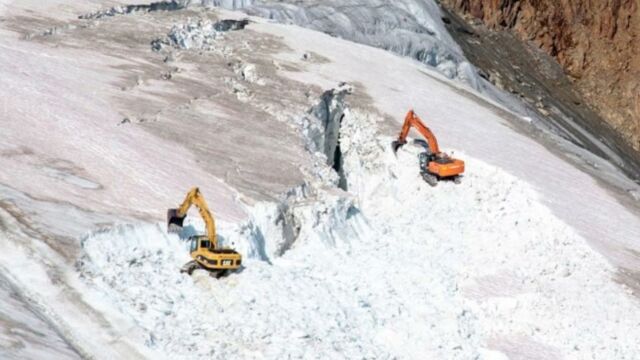This comes just days after the Climate Summit at the UN headquarters in New York, at a time where the scientific community's predictions are becoming more and more pessimistic (not to say worse).
Discover our latest podcast
As you can see in the pictures taken last August by the World Wildlife Fund (WWF) in Austria, excavators and snow groomers have been hard at work for several weeks now on the Pitztal glacier, Tyrol's highest glacier (3000 meters). They're "distributing the snow to create slopes for the coming ski season," reports Montagnes Magazine.
Dozens of acres of glacier disappeared
The least we can say is that a lot of organizations, including the WWF, are worried. Especially considering that this project has another component, which is currently still under consideration and would involve merging the Pitztal and Ötztal glaciers and their ski areas.
But what's truly frightening is how they plan to achieve this. The ski resort estimates that they will have to level no less than 64 hectares (about 90 football fields) of the glacier to form the ski slopes. In addition to this, an extra 1.6 hectares of ice will have to be removed. On 24 June, the Austrian Alpine Association, nature lovers, and the WWF Austria called for an immediate halt to this project, which is as colossal as it is disastrous for the environment.
"It's like the destruction of the Amazon rainforest"
😱 😠 WWF: Austria wants glacier to destroy it for expansion of ski resort https://t.co/XvZRCZzYBe via @The Global Domain News @Un@wwf @ @GretaThunberg@350@350France@350Europe@hugoclement#ClimateStrike#climatactionpic.twitter.com/p8fNhPaBjr
— Green82 (@rania8419) September 23, 2019
"It's like the destruction of the Amazon rainforest," glaciologist Sylvain Coutterand told BFMTV. "We're heading straight for disaster, and we're going to regret it. Mankind refuses to learn from the past."
"This will impact low flows (a stream's minimum flow rate) and the amount of available water. During intense periods of heat, there will no longer be any more resources," he added. The organizations that opposed the project now fear that the ski resort will start construction even though they don't have all the necessary permissions.
And this isn't an isolated case. Last Sunday, September 22, Switzerland held a "funeral march" for the Pizol, a glacier that was lost to global warming.















